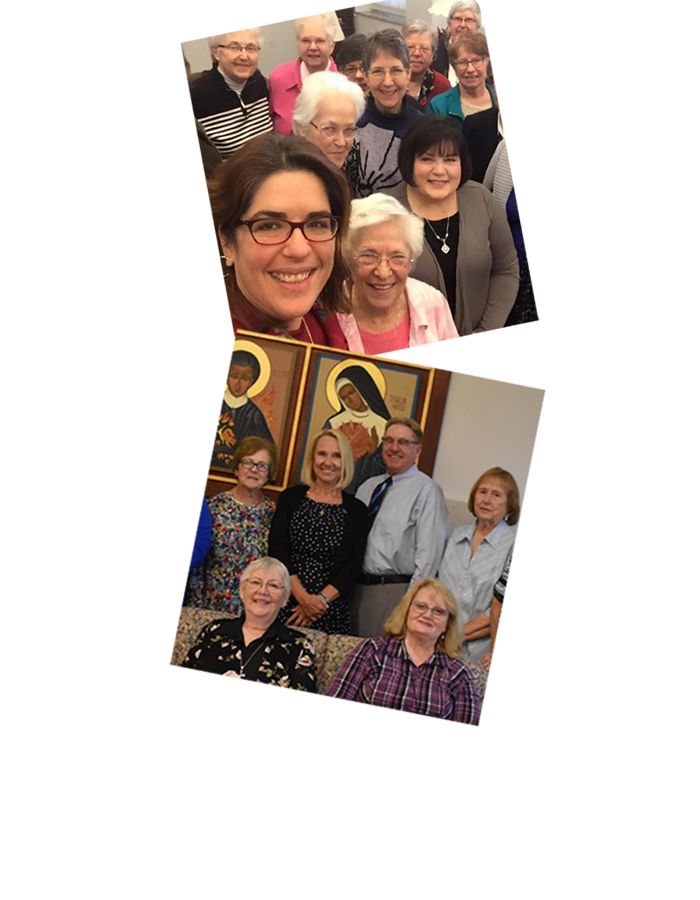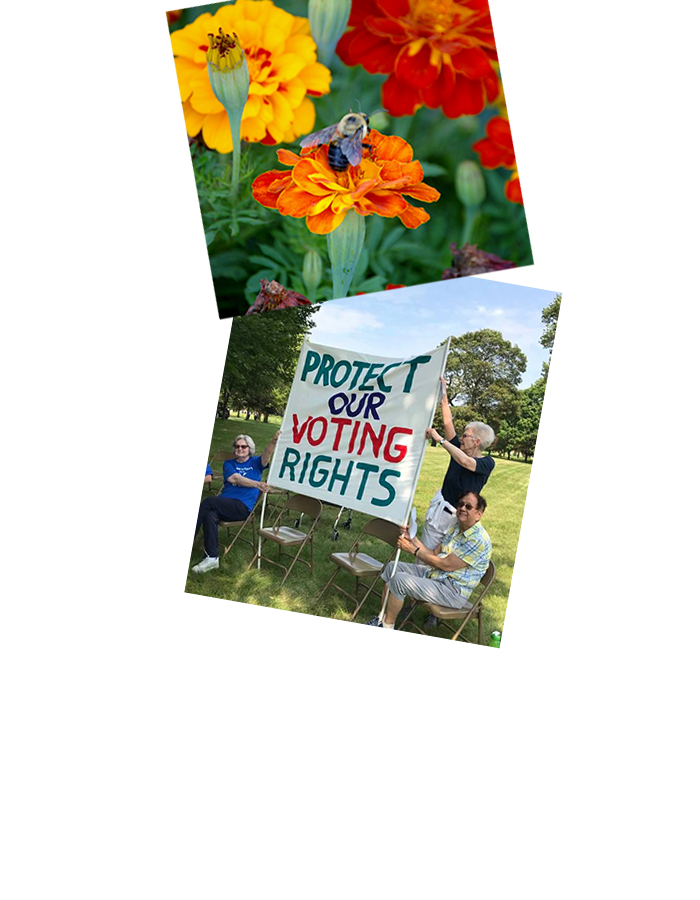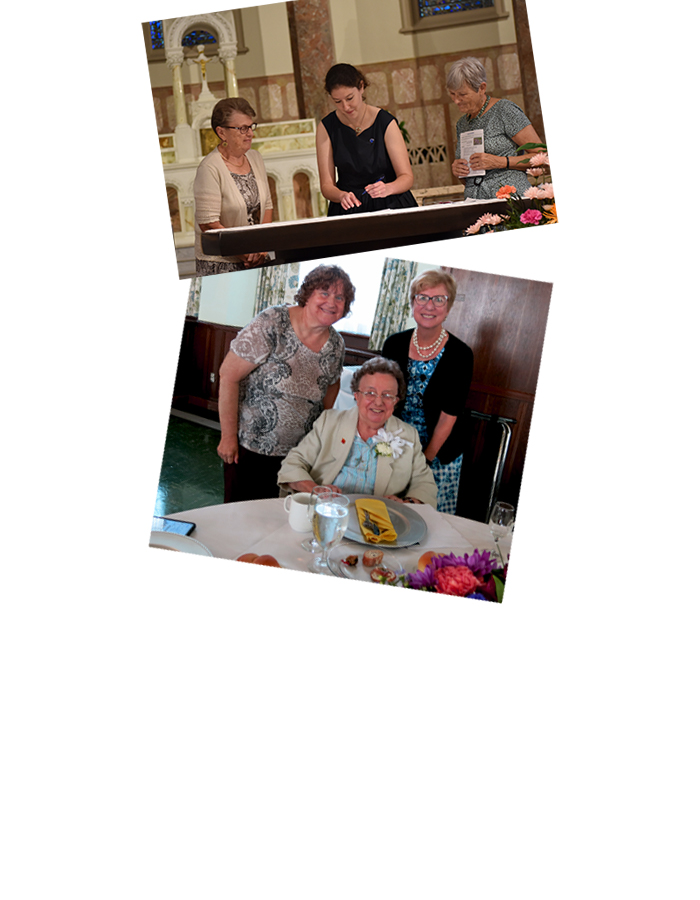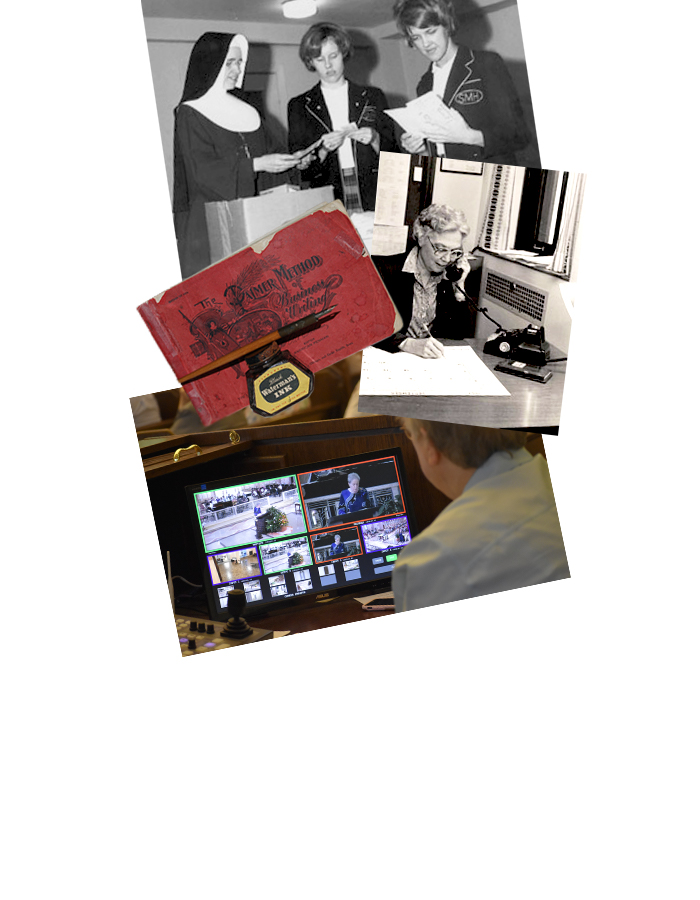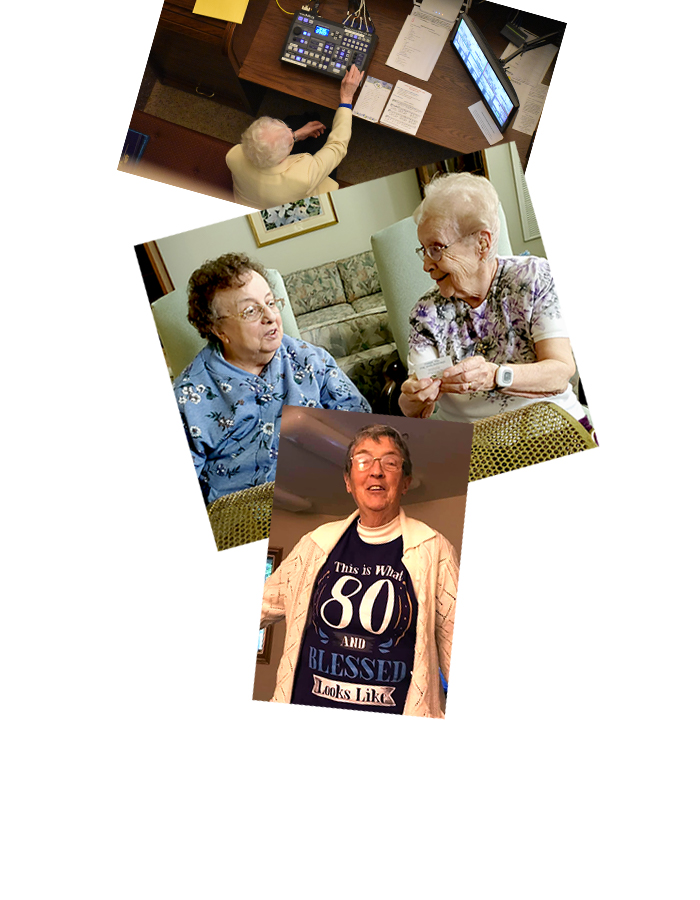Detroit is best known for its automotive and “Motown” music legacies, but the IHM community has a rich history in Detroit. Many IHM Sisters grew up in the city and attended Detroit parishes and schools. Over the years, IHMs have founded, sponsored and staffed more than 38 schools in the city of Detroit including; St. Joseph School, Holy Redeemer High School and Grade School, Gesu Grade School, Immaculata High School, Marygrove College, Our Lady of Guadalupe Middle School and Detroit Cristo Rey High School. Two schools in Detroit (Marygrove and Detroit Cristo Rey) are still sponsored by the IHM congregation. More than two dozen sisters and associates currently minister in the city.
Detroit’s population peaked in 1950 and has slowly declined since. Racism, “white flight” to the suburbs, the decline of the United States automotive industry in a global economy, government corruption and the 2008 global financial crisis are among the complex reasons for the decline. This has resulted in a significantly reduced tax base, depressed property values, abandoned neighborhoods, high crime rates and a pronounced demographic imbalance. Michigan Governor Rick Snyder declared a financial emergency in March 2013 and appointed an emergency manager. In July, 2013, Detroit became the largest U.S. city to file for bankruptcy. The city emerged from bankruptcy nearly a year and a half later. However, there is much work that needs to be done in order to chart a sustainable course for a city rescued from financial collapse but still struggling.
This page will post thoughtful analysis of the challenges facing Detroit and highlight the efforts of some who are forging innovative solutions to these social, economic and environmental problems.
Online Resources
Detroit Fights For Fair Water Access
By Eleanor Greene, Green America, October 2017
“We the People of Detroit” is fighting to ensure that Detroiters have fair, equitable and uninterrupted access to clean water.
Toxic Town: Michigan’s Most Polluted Zip Code
Bill Kubota, One Detroit/Detroit Public Television for Great Lakes Now, June 19, 2017
Professor Paul Mohai of the University of Michigan’s School of Natural Resources and Environment looked at air quality data in a part of Southwest Detroit, called 48217 for its zip code – predominately African American and surrounded by heavy industry. He found 48217 to be most toxic zip code in Michigan. The upside? 48217 is getting more attention in the neighborhood’s fight for environmental justice there.
Detroit Is Ground Zero in the New Fight for Water Rights
Laura Gottesdiener, The Nation, July 15, 2015
“As many as 25,000 families are at risk of having their water shut off. These activists are fighting back.”
Water Issues and Local and Global Interconnections
By Elizabeth Walters, IHM
Detroit Water Affordability is a Regional Responsibility – A Fact Sheet
Detroit People’s Water Board, July 2015
“To fully understand the water shutoff crisis, it is important to know that this crisis did not develop in a vacuum. The Detroit water shutoffs are inextricably tied to larger forces seeking to reshape the city in an image that doesn’t include its poorest residents.”
Congressional Briefing: Trouble on Tap: Challenges to Affordable Water in the U.S. – The View From Detroit By Alice B. Jennings, Esq. Edwards & Jennings, P.C., Feb. 26, 2015
This presentation was delivered at the Congressional Hearing on Water Rights in Detroit.
Faith in Detroit – Press Release and Statement
Faith in Detroit, Feb. 22, 2015
Faith in Detroit is a gathering of women and men from Catholic religious communities who live and/or minister in the City of Detroit. They are committed to listening, participating and collaborating to effectively address the challenges facing the city.
International human rights network intervenes in case challenging large-scale disconnection of water supply to tens of thousands of low-income residents in Detroit
The International Network for Economic, Social and Cultural Rights (ESCR-Net), Feb. 9, 2015
A global network of more than 220 groups and 50 individual human rights advocates from around the world has requested to be recognized as amicus curiae in the case of Lyda et al. v. City of Detroit, in support of residents challenging the City of Detroit’s decision to cut off water supply to thousands of households unable to pay their bills.
Wall Street Pushed Bad Detroit mortgage loans
John Gallagher, The Detroit Free Press, Jan. 26, 2015
A potential class action against the investment firm Morgan Stanley alleges that the foreclosure crisis that devastated Detroit was engineered at the highest levels of Wall Street.
What Happens When Detroit Shuts Off the Water of 100,000 People?
Rose Hackman, The Atlantic, July 17, 2014
Some run dry—and others pay $30 for plumbers to illegally turn the taps back on.
Hammer: Leave Community Benefits to Communities
Peter Hammer, Detroit News, Dec. 11, 2014
Detroit’s Equitable Development Coalition is seeking economic development that will result in real community benefits for the citizens and businesses of the city.
Two Detroits, Separate and Unequal: A Journey Across a City Divided
Laura Gottesdiener, Tom Dispatch, Nov. 16, 2014
On the brink of a new, post-bankruptcy beginning, Detroit is really two cities. One is comprised of wealthy enclaves linked to a compact, rapidly redeveloping downtown. The other is made up of the rest of the 139-square-mile urban expanse, populated by longtime residents who have fought for decades to survive in an environment that has become increasingly uninhabitable.
Life Without Water
Circle of Blue, August 2014
A beautiful photo slideshow with neighborhood quotes and brief commentaries on the Detroit water struggle
Thousands March for Water Rights in Detroit
Ruth Conniff, PRWatch, July 19, 2014
Thousands of people marched through downtown Detroit to call attention to a major public health crisis as the city shuts off the water for residents who are behind on their bills.
‘Escalating Resistance’ in Detroit as Residents Block Water Shut-Offs
by Sarah Lazare, Common Dreams, July 10, 2014
“The issue of whether water should be a commodity or part of the commons raises the question of what kind of future we want.”
UN to Detroit: Denial of Water to Thousands ‘Violates Human Rights’
Sarah Lazare, Common Dreams, June 24, 2014
United Nations experts declared that the city of Detroit’s water shut-off to thousands of residents who are unable to pay their bills “constitutes a violation of the human right to water.”
Submission to the Special Rapporteur on the Human Right to Safe Drinking Water and Sanitation Regarding Water Cut-offs in the City of Detroit, Michigan
The Blue Planet Project, June 18, 2014
The official report to the United Nations about access to water in Detroit
Groups Appeal to UN for ‘Humanity’ as Detroit Shuts Off Water to Thousands
By Sarah Lazare, Common Dreams, June 18, 2014
As thousands of people in Detroit go without water and the city moves to cut off services to tens of thousands more, concerned organizations have taken the unusual step of appealing to the United Nations to intervene and protect the “human right to water.”
Detroit’s Good Food Cure
Larry Gabriel, Yes! Magazine, Dec. 12, 2012
What happens when the Motor City transforms itself into the capital of grow-your-own food?
Web Links
Michigan Welfare Rights Organization
The Michigan Welfare Rights Organization is the union of public assistance recipients and low-income workers in this state.
People’s Water Board
The People’s Water Board advocates for access, protection and conservation of water. They believe that water is a commons that should be held in the public trust, free of privatization.
Great Lakes Bioneers Detroit
GLBD promotes collaboration and networking among Southeast Michigan individuals and organizations working on sustainability and eco-justice issues.
The James and Grace Lee Boggs Center
The Boggs Center nurtures the transformational leadership capacities of individuals and organizations committed to creating productive, sustainable, ecologically responsible and just communities – in Detroit and beyond.
Detroiters Working for Environmental Justice
DWEJ is a coalition of community leaders, academia, environmentalists and others committed to helping Detroiters create an empowered community that can address environmental concerns and participate in decision-making.
Detroit Eviction Defense
Detroit Eviction Defense is a coalition of homeowners, union members, faith-based activists, community advocates and allied groups united in the struggle against foreclosure and eviction.
Detroit People’s Platform
The People’s Platform is a broad network of Detroit-based social justice organizations, activists and residents committed to bringing about just transformation in politics, economics and social dynamics.
Videos and Interactive Resources
VIDEO: Charles Hamilton Houston Peoples Lawyer Series
Charles H. Wright African American History Museum, June 11, 2016
This presentation gives a good background understanding of the housing foreclosures and the water shutoffs in Detroit. It will help the viewer put it in historical context, connecting the dots with structural racism.
Drops in the Bucket
ACLU of Michigan, Aug. 5, 2015
In and around Detroit, tens of thousands of low-income residents are faced with the bleak prospect of having their water service terminated. Drops in the Bucket, a new video on the water crisis from the ACLU of Michigan, explores how the mayor’s attempted affordability fixes have fallen woefully short.
Detroit Water – Not Flowing
U.N. TV – 21st Century, Jan. 21, 2015
This 15-minute video provides a concise explanation of the Detroit water crisis.
Books
Arc of Justice: A Saga of Race, Civil Rights, and Murder in the Jazz Age By Kevin Boyle
The book chronicles racism in Detroit during the 1920s Jazz Age through the lens of Ossian Sweet, grandson of a slave who becomes a doctor and eventually moves from the ghetto to an all-white middle-class neighborhood.
The Origins of the Urban Crisis: Race and Inequality in Postwar Detroit By Thomas J. Sugrue
In this reappraisal of America’s racial and economic inequalities, Thomas Sugrue asks why Detroit and other industrial cities have become the sites of persistent racialized poverty. He challenges the conventional wisdom that urban decline is the product of the social programs and racial fissures of the 1960s.
